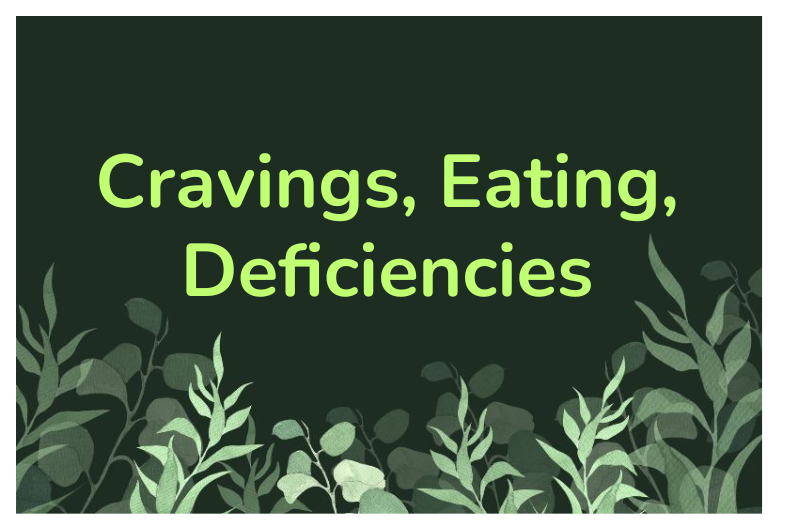
Understanding Food Cravings: Emotional Eating and Nutritional Needs
Food Cravings, Emotional Eating, Nutritional Deficiency Signs: What Your Body Might Be Telling You
Food cravings can seem mysterious or even frustrating, especially when they pop up out of nowhere. Many people find themselves reaching for chocolate, chips, or other comfort foods, wondering if it's a sign of a deeper need or just a passing mood. Food cravings often signal an emotional response, but sometimes they can point to underlying nutritional deficiencies that the body is trying to address (read more about craving signals).
MC Herbs believes that natural health starts with paying close attention to what the body truly needs. Emotional eating and cravings don't happen by accident—they could be the body's way of asking for specific nutrients, especially if a person is missing out on essential vitamins or minerals. Experts like Gary Brecka and Barbara O’Neil often talk about tuning into these signals and using whole foods, natural nutrients, and supplements to bring balance.
Because many people are curious about how to tell the difference between emotional eating and real nutritional needs, this article explores easy ways to spot the signs and discover simple, natural support. When the body needs help, gentle solutions like herbal blends and natural supplements from MC Herbs can offer real support for cravings, mood, and nutrition.
Key Takeaways
- Food cravings may be linked to emotions or missing nutrients
- Noticing craving patterns can help reveal what the body needs
- Natural supplements from MC Herbs can support healthy balance
Understanding Food Cravings and Emotional Eating
Food cravings and emotional eating affect people’s eating behavior in different ways. Understanding how emotions, hormones, and daily habits interact can help people make wiser food choices and feel more in control of their health.
What Differentiates Food Cravings from Hunger
Food cravings and hunger might feel similar at first, but they aren’t the same thing. True hunger comes on gradually, is satisfied by many different foods, and is a natural signal from the body. Food cravings, on the other hand, are usually sudden and often focus on a very specific food like chocolate, chips, or ice cream. The craving might not go away even after eating regular food.
Cravings are often driven more by emotions, hormones like serotonin, and environmental cues, such as seeing a commercial for snacks. Natural health advocates like Gary Brecka believe that food cravings can suggest a nutritional deficiency or imbalance in hormones like ghrelin and leptin. Using mindful eating can help a person tell whether they are feeling genuine hunger or just having a craving.
Supplements from MC Herbs are designed to support the balance of these hormones and help control cravings naturally.
Common Emotional Triggers and Emotional Hunger
Emotional eating often starts with something other than hunger. People may turn to food when they feel sad, stressed, bored, or even excited. These emotions can lead to overeating or even binge eating. Unlike physical hunger, emotional hunger usually comes on quickly and urges a person to eat comfort foods right away.
Top emotional triggers include:
- Stress or anxiety
- Loneliness
- Sadness
- Boredom
- Reward or celebration
Barbara O’Neil and other natural health experts point out that emotional cravings can become a habit. By identifying what triggers their cravings, people can start finding healthier habits like walking, journaling, or taking natural stress relief supplements from MC Herbs.
How Emotional States Influence Eating Behavior
Emotional states can change the way a person eats, sometimes without them even noticing. When stress levels are high, the body releases cortisol, which can boost appetite and drive cravings for sugary or fatty foods. This often leads individuals to reach for foods that provide quick comfort or reward.
Unmanaged emotions can lead to unhealthy patterns such as food addiction, overeating, or using food to self-soothe. Practicing mindfulness and self-regulation—like pausing before eating or checking in with personal feelings—may help reduce emotional eating. Some people find that adaptogen herbs and natural formulas from MC Herbs help them manage stress and support a more balanced mood, making mindful eating easier.
Noticing how emotions affect eating can be the first step to building better health habits. Little changes, like drinking water when a craving hits or taking deep breaths, can also help manage emotional hunger.
Nutritional Deficiency Signs Behind Specific Cravings
Food cravings can have deeper meanings when it comes to nutrient needs. Some sudden urges for certain foods can point directly to missing vitamins or minerals in the body.
Identifying Cravings Linked to Nutrient Gaps
Strong, specific cravings are rarely random. When someone craves chocolate, ice, or red meat, the body could be asking for nutrients like magnesium or iron.
For example, chocolate cravings are commonly seen in people low in magnesium. Those who reach for ice cubes might be experiencing iron deficiency, a condition called pica that especially shows up in children and pregnant women.
Paying attention to repeated cravings is important. If a person always wants sugar, their body may need healthy carbs or chromium. These patterns give helpful clues about what is missing from their diet.
Common Deficiencies and What They Signal
Some nutrient gaps show up with clear signs:
- Magnesium deficiency: frequent chocolate cravings, muscle cramps, fatigue.
- Iron deficiency: craving ice (pica), feeling tired, pale skin.
- Zinc deficiency: poor sense of taste or smell, more frequent illnesses.
- Calcium deficiency: craving cheese or dairy; brittle nails; muscle twitching.
People low in these nutrients might also seek out foods like leafy greens, red meat, or whole grains. For example, the urge for nuts, almonds, or seeds could point to a magnesium shortage, while longing for eggs or lentils might signal a need for iron or protein.
A quick reference table:
| Craving | Possible Deficiency | Natural Food Sources |
|---|---|---|
| Chocolate | Magnesium | Almonds, spinach, seeds |
| Ice | Iron | Red meat, beans, lentils |
| Sugar | Chromium, Magnesium | Whole grains, nuts |
| Cheese/Dairy | Calcium | Leafy greens, sesame seeds |
Addressing and Preventing Deficiency-Driven Cravings
Natural health experts like Gary Brecka and Barbara O’Neil believe that adding nutrient-rich foods right away can help rebalance these cravings.
Focusing on whole foods helps fill nutrient gaps. Adding roasted chickpeas, miso, or seaweed boosts minerals like zinc and magnesium. Leafy greens, tomatoes, and oranges deliver vitamin C, which helps with iron absorption.
Many also find that simply including healthy fats such as walnuts, olives, or chia seeds in daily meals keeps sudden sugar or carb cravings in check.
For anyone still struggling with common cravings, MC Herbs offers natural supplements tailored to support magnesium, iron, and other needs. These plant-based blends work as an easy boost until diet alone meets the body's demands. Replenishing missing minerals is often the best way to quiet persistent, hard-to-satisfy cravings.
Frequently Asked Questions
Food cravings might be triggered by gaps in nutrition, emotions, or even certain habits. Understanding these causes helps people make more mindful decisions about what they eat each day.
How can you identify if your cravings are due to a lack of certain nutrients?
A person who craves chocolate regularly may have a magnesium deficiency. Constantly chewing ice is often linked to low iron levels, a pattern seen in the condition called pica. Cravings for salty or savory foods can sometimes hint at missing minerals.
Choosing a diet rich in whole foods often reduces cravings related to nutritional gaps, as suggested by many natural health advocates. Adding high quality supplements from MC Herbs can also help fill in these gaps when diet alone falls short. Learn more about how different cravings reflect nutrient needs at this food craving meanings chart.
In what ways do our emotions influence our food choices?
Stress, sadness, or boredom can all drive a person to reach for sugary treats, chips, or comfort meals. Emotional eating isn’t about physical hunger but about coping with feelings. This is common during stressful times or after an argument.
Experts like Gary Brecka point out that emotional imbalance in daily life often makes people crave calorie-dense foods that lift their mood for a short while.
What emotional cues should we be aware of that might signal an eating disorder?
Eating in secret, hiding food, or feeling shame after eating are common signs to watch for. Turning to food each time a negative emotion comes up, or feeling completely out of control around food, may also raise concerns.
Intense guilt or anxiety around food choices can sometimes point toward deeper emotional struggles.
Why do we sometimes turn to food for comfort, and what triggers this behavior?
The body naturally releases feel-good chemicals like dopamine when people eat sweets or high-fat foods. This enjoyable sensation makes it easy to use food as a reward or distraction.
Common triggers include loneliness, work stress, boredom, or even childhood patterns shaped by family routines. Barbara O’Neil discusses how these patterns can be changed by noticing triggers and choosing healthier routines.
Can food cravings be a window into our emotional health?
Frequent cravings for certain flavors or textures, like sweets or crunchy snacks, often relate to emotions more than physical needs. This pattern gives clues about a person’s stress levels, habits, or even emotional resilience.
MC Herbs herbal blends are sometimes used to support calmer moods and improve emotional balance naturally.
How do we differentiate between simple hunger and eating driven by emotions?
Physical hunger builds gradually and can be satisfied with any healthy meal or snack. Emotional hunger usually comes on fast and involves a strong desire for specific comfort foods.
Eat slowly and pay attention to feelings before and after eating. If the hunger goes away with something simple like water or a walk, it was likely emotional.
